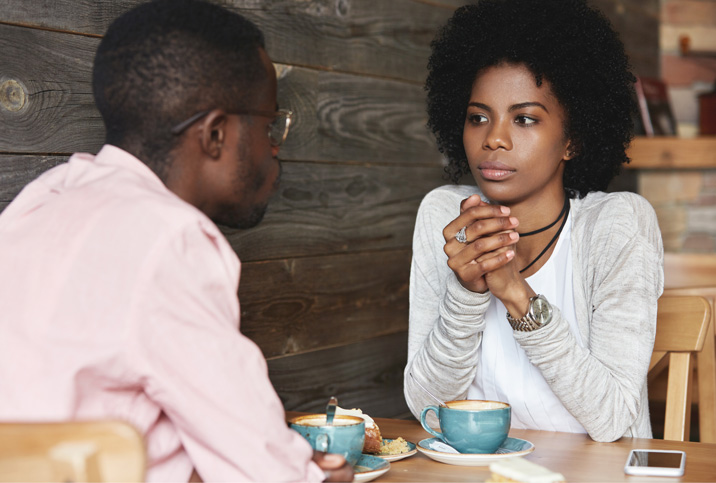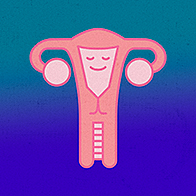Talking About Your Endometriosis Is Good for You and Your Relationship

Editor's note: Some of the sources for this article requested their full names and locations not be used.
Endometriosis is a common chronic condition that impacts 1 in 10 women during their reproductive years. The condition has a significant impact on the quality of life of women who suffer from it, but also inevitably ends up affecting the lives of people around the sufferer—including partners and spouses.
Endometriosis is a condition in which the endometrium, the lining of the uterus, is found outside the uterus, often connected to adjacent structures such as the ovaries and fallopian tubes.
The symptoms of endometriosis can feel embarrassing or even shameful (although they shouldn't), but open communication with your partner is paramount to a healthy relationship.
Here are some tips to make the conversation comfortable and as mutually beneficial as possible.
Education is key
Although your partner may know you have endometriosis, they may not understand the nature of the condition. Explain to them as best as you can. It may be useful to share some resources so they can learn about the condition. Endometriosis is complex, and there is no definitive list of symptoms. Tell them about your endo and what works and doesn't work for you. Don't be afraid to ask for help.
Navigating a chronic condition can be lonely and isolating, but it's important to remember that you don't have to do this alone. Just like it probably took you time to learn about endometriosis and how to live with it, your partner may also need time to understand. Try to be as patient as you can while they adjust.
"It can be emotionally challenging living with any physical health condition," said Laura Shepherd, C.Psychol., a clinical psychologist in Dronfield, England. "Research shows that social support can help people with physical health problems."
The symptoms of endometriosis can vary day by day, so it's important for your partner to understand what to do when you are having a rough time.
"Communicating with your partner about having endometriosis may be helpful for you to get support and help you cope when you are having difficult days, as well as fostering a relationship with strong communication and openness," Shepherd said.
Choosing a time to tell your partner about your diagnosis is up to you.
"It is common not to know when or how to tell a partner about a physical health problem and how this may impact you and your relationship," Shepherd said. "Take control of this and tell your partner in your own time and when you feel ready. Some people find it useful to practice what to say and prepare some answers to possible questions a partner may have."
How to navigate difficult topics
Although we'd like to think we're completely comfortable around our partners, there can be some topics that are particularly difficult to approach.
Pain and bleeding during or after sex is a common symptom of endometriosis, and it's important to open up to your partner if you are struggling with this problem. If you want to maintain a physical relationship, your partner needs to understand how sexual activities can potentially cause you discomfort.
While you may want to meet certain expectations that come from being in a relationship, it's important to prioritize your health, and explaining this to a partner helps with both physical and emotional intimacy as you explore alternative approaches that work for you.
For example, if penetrative sex is particularly uncomfortable or painful, you can investigate other positions or sexual acts. Physical intimacy is an important part of most relationships, and exploring new ways to give you and your partner pleasure helps them gain a better understanding of your body and also your endo.
Similarly, endometriosis can often lead to difficulty conceiving naturally, and this is something you may wish to discuss with your partner. While you may feel a sense of guilt and distress, it's important to remember that endometriosis is out of your control and putting pressure on yourself isn't helpful for you or your partner.
Consult your partner about your wishes for your future family. Women with endometriosis have several fertility methods available, including in vitro fertilization (IVF), surrogacy and adoption. Discuss options with your partner, as well as a doctor, and come up with a plan that's comfortable for both you and your partner.
Marital and sexual relationships are one of the most widely impacted areas of life for people with endometriosis, according to a 2014 study published in BMC Women's Health.
Tom struggled when his partner, Lucy, was diagnosed with the condition and told they wouldn't be able to naturally conceive.
"It takes time to come to terms with how this will impact your relationship going forward," Tom said. "The most important thing was communicating openly. There were some topics that were difficult, but we found that taking turns to talk about our feelings helped and gave us both the chance to share our feelings. Without being honest, we would have really struggled."
Keep your partner involved
It may be useful to keep your partner involved in your endometriosis treatment and journey.
"Women's health shouldn't be something that's whispered about in secret. We need to learn to be more open about menstrual period[s] and conditions like endometriosis, particularly men," said Gareth Nye, Ph.D., lecturer of physiology at Chester Medical School in Chester, England. "I would always suggest, where possible, having partners attend appointments so that information can be received and any questions can be asked at the time."
Although endometriosis does not affect your partner's body, it can affect their life, so it's important that they're aware of what you're going through and how they can help.
A 2006 study published in the Journal of Psychosomatic Research suggested that the male partners of women with endometriosis often experience anxiety, low mood and feelings of helplessness in relation to their partner's condition.
If you and your partner are struggling to communicate about the condition or find it is significantly impacting your relationship, it may be beneficial to consult a professional who can help both of you engage in these conversations in a productive manner.
Learning how to navigate endometriosis alongside your relationship may take some time and require patience, but communicating openly with a supportive partner can make a world of difference. Your partner wants to help you, and being transparent with them throughout your endometriosis journey is key to a healthy relationship.




















